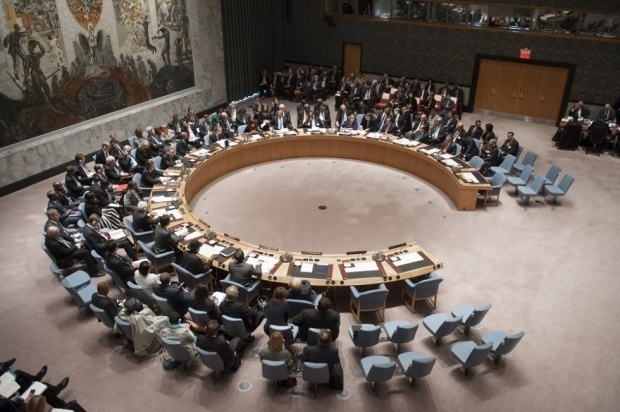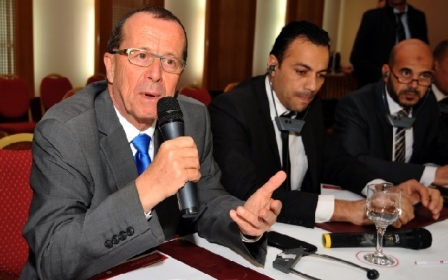UN chief hopefuls face grilling on Middle East crises

NEW YORK, United States – For decades, the UN’s top official was chosen secretly by the US, Russia and other great powers. That changes this week, with a more open process and public hearings that are expected to deal with the plight of Syrians, Palestinians and other crises.
From Tuesday, eight candidates who seek to replace the current UN secretary-general, the South Korean diplomat Ban Ki-moon, on 1 January 2017, will appear before UN members and non-profit groups to field questions on peacekeeping, human rights and security.
Ban is praised for his work on global warming and poverty, but has been criticised for kowtowing to Washington, Moscow and other capitals and failing to alleviate the suffering of Palestinians and war-ravaged Syrians.
“The secretary-general isn’t only a bureaucrat. He is expected to show leadership in line with the UN principles and play a major role in addressing the world’s problems,” Richard Bennett, UN director for the pressure group Amnesty International, told Middle East Eye.
“The current secretary-general has delivered to some degree on climate change … but I don’t think you could say the same about peace and security. If anything, that is going backwards.”
The nominees to replace him include Croatia’s former foreign minister, Vesna Pusic, New Zealand’s former Prime Minister Helen Clark and the head of the UN’s culture agency Unesco, Irina Bokova – the bookmaker’s favourite.
Syria and Palestine high on priority list
Middle East crises are high up the world body’s agenda, including a Syrian conflict that has eluded successive UN peace envoys, claimed as many as 470,000 lives and sent millions of refugees spilling across its borders.
The Israeli-Palestinian dispute has confounded diplomats for decades and often left UN aid workers picking up the pieces. After years of unproductive US-led peace talks, efforts are underway to bring that issue back to the UN Security Council.
Sadly, one of those running to be the next UN chief is not optimistic about peace prospects.
“I’m not smarter than all the people that have tried,” said Pusic.
“So I cannot tell you that I would find a deus ex machina [quick fix] here that would solve that, but I would definitely insist on sending some of the best people to talk to both sides continuously and without giving up.”
Pusic and her rivals will be grilled on such global concerns during separate, two-hour sessions over three days at the UN Trusteeship Council, in New York, and at some privately run debates in the US, UK and elsewhere.
Security Council influence
The more transparent process seeks to challenge the disproportionate influence wielded by the permanent five (P5) members of the UN Security Council – Russia, China, Britain, France and the US – which typically make decisions behind closed doors.
Traditionally, P5 states have vetted candidates in straw polls and veto anybody they dislike. Their preferred candidate is endorsed by a vote of the 15-nation council, who is then rubber-stamped by the General Assembly of all 193 UN members.
This process favours candidates who are beholden to Washington, Moscow and Beijing and to a lesser extent, to London and Paris, said Bill Pace, director of the 1 for 7 Billion campaign, which seeks to raise the calibre of UN bosses.
The formal rules for selecting UN chiefs are brief. Article 97 of the UN Charter says that the world’s top diplomat “shall be appointed by the General Assembly upon the recommendation of the Security Council”.
A convention of regional rotation meant that the next UN chief would be Eastern European, but two of the eight declared candidates are from elsewhere. Many campaigners say that after eight male UN bosses since 1946, it is time for a woman.
While activists and smaller UN members have successfully campaigned for this week’s public hearings, the P5 states are still only expected to offer one candidate for the General Assembly to vote on later this year.
Mogens Lykketoft, president of the UN General Assembly, said the new process could take decision-making away from the P5’s “dark, back room discussions” by pressuring them to select a “strong personality”.
“It’s a potentially game-changing exercise,” Lykketoft told MEE.
“If there is a critical mass of member states rallying around one candidate … during the spring and the summer, it will be much more unlikely that the Security Council would come forward with quite another name.”
He called for a “political, diplomatic, high-skilled person” who can simultaneously crack the whip on a bloated bureaucracy while nudging P5 states into acting in warzones “with the authority, so to say, of a secular Pope”.
Others are less optimistic that this week’s sessions will lead to a more freethinking UN chief.
Big stakes conflicts
During his two, five-year terms on the job, Ban has struggled to address crises in which P5 members have big stakes – including Syria (a Russian interest), Israel-Palestine (the US) and the civil war in Sri Lanka (China).
Bennett, from Amnesty, said that those running to replace Ban plan to have this in mind.
“When it comes to the straw polls, behind-closed-doors in the Security Council, any candidate that speaks out too strongly about certain issues – human rights being one of those issues – is going to risk being penalised, being vetoed,” Bennett told MEE.
MEE asked two frontrunners whether they would let Washington, Moscow and Beijing boss them around.
Pusic noted that, ultimately, the Security Council would decide whether she gets the job.
“I think for the foreseeable future we will have to balance between these two sides and give more transparency to certain processes but also make sure that none of the big Security Council permanent members leaves the organisation because, if that happened, it would make the organisation dysfunctional,” Pusic told MEE.
Clark, the New Zealander who currently runs the UN Development Programme, gave an equally diplomatic answer.
“I fully acknowledge the importance of the P5, as I acknowledge the importance of every member state,” she told MEE.
Stay informed with MEE's newsletters
Sign up to get the latest alerts, insights and analysis, starting with Turkey Unpacked
Middle East Eye delivers independent and unrivalled coverage and analysis of the Middle East, North Africa and beyond. To learn more about republishing this content and the associated fees, please fill out this form. More about MEE can be found here.




